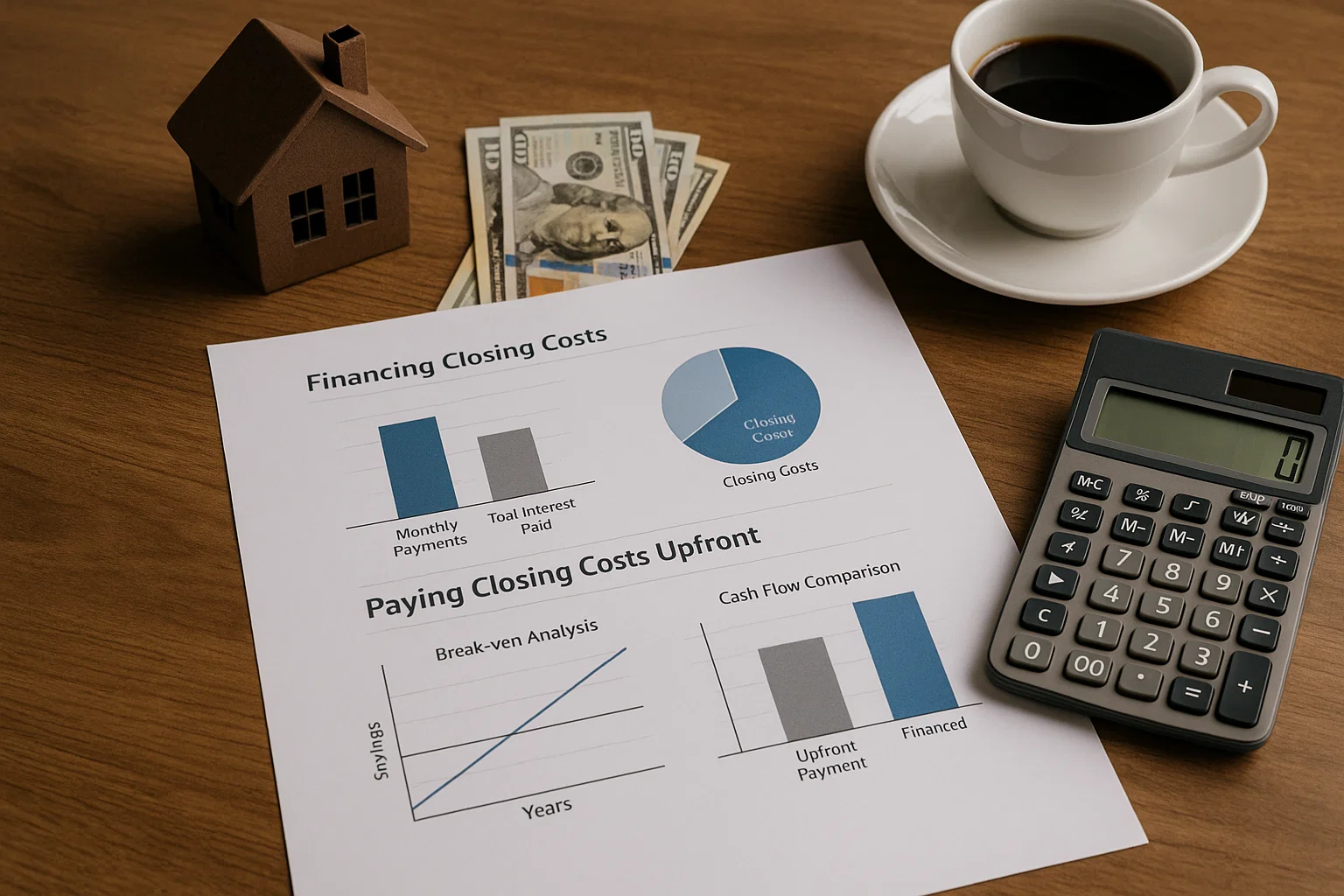.png)
Understanding VA loan closing costs helps veterans optimize their homebuying and refinancing decisions while managing debt-to-income ratios effectively within jumbo loan scenarios or standard purchases. Disabled veteran home loans offer additional cost advantages through funding fee exemptions and specialized benefits that can dramatically reduce total closing expenses. This comprehensive cost analysis reveals strategies for minimizing expenses while maximizing the powerful advantages VA loans provide to eligible military borrowers.
Are you concerned about the total costs of using your VA loan benefits, especially when dealing with closing costs that can range from $7,500 to over $23,000 depending on your loan amount? Many veterans focus solely on the no down payment advantage without fully understanding how closing costs interact with debt-to-income calculations and jumbo loan scenarios. Today we'll break down every component of VA closing costs, examine special advantages for disabled veterans, and provide actionable strategies to minimize your out-of-pocket expenses while maintaining strong debt-to-income ratios. Whether you're buying your first home or refinancing an existing property, understanding these costs upfront can save thousands and help you make informed financial decisions.
VA Loan Closing Costs Breakdown and Analysis
VA loan closing costs typically range from 2% to 6% of the loan amount, with total expenses varying based on loan size, geographic location, and lender policies. For a $300,000 loan, veterans can expect closing costs between $6,000 and $18,000, though specific components and actual amounts depend on individual circumstances and market conditions.
VA funding fee represents the largest single component, ranging from 0.5% for IRRRL refinancing to 3.6% for subsequent users making no down payment. First-time VA loan users pay 2.15% funding fees for zero-down purchases, equating to $6,450 on a $300,000 loan, while disabled veterans receiving VA compensation are completely exempt from all funding fees regardless of usage history.
Origination fees are capped at 1% of the loan amount by VA regulations, providing cost protection compared to conventional loans where origination fees can exceed these limits. Third-party costs including appraisal fees ($400-700), title insurance, credit reports, and recording fees add typically $1,500-3,000 to total closing expenses depending on property location and transaction complexity.
VA Loan Debt-to-Income Ratio Impact on Closing Costs
VA loan debt-to-income ratio calculations include the new mortgage payment with principal, interest, taxes, insurance, and any HOA fees when determining qualification, making accurate closing cost estimates crucial for proper financial planning. Prepaid items such as property taxes, homeowners insurance, and initial escrow deposits can add $2,000-5,000 to closing costs depending on local tax rates and insurance premiums.
Cash-to-close calculations must account for closing costs when veterans need to maintain debt-to-income ratios below 41% while preserving adequate residual income for living expenses. Seller concessions up to 4% of purchase price can offset closing costs, effectively reducing cash requirements while helping veterans maintain favorable DTI ratios.
Financing closing costs into the loan amount increases the monthly payment and affects debt-to-income calculations, requiring careful analysis of whether higher monthly payments or upfront cash payments better support long-term financial objectives. Break-even analysis helps determine optimal strategies for managing closing costs within DTI constraints.
VA Jumbo Loan Closing Cost Considerations
VA jumbo loan scenarios exceeding $806,500 in most areas or $1,209,750 in high-cost regions may involve additional closing costs and premium pricing that affects total transaction expenses. Full entitlement veterans can access unlimited borrowing capacity above $144,000 without down payment requirements, though closing costs scale proportionally with loan amounts.
Jumbo funding fees follow standard VA schedules, meaning disabled veterans remain exempt regardless of loan size, while non-exempt veterans pay 2.15% to 3.6% on entire loan amounts including jumbo portions. On a $1,000,000 loan, first-time users face $21,500 funding fees unless exempt, creating substantial cost advantages for disabled veterans in high-value markets.
Premium pricing for jumbo loans may increase interest rates by 0.125% to 0.375% compared to conforming loans, affecting long-term costs beyond initial closing expenses. Portfolio lenders specializing in VA jumbo loans sometimes offer more competitive pricing and flexible terms than institutions bound by secondary market guidelines.
Disabled Veteran Home Loans Cost Advantages
Disabled veteran home loans provide complete funding fee exemptions for veterans receiving VA disability compensation, Purple Heart recipients, and eligible surviving spouses, eliminating the largest component of VA closing costs. These exemptions save $6,450 on a $300,000 first-time purchase or $10,800 for subsequent users, providing immediate substantial cost advantages.
VA disability compensation counting as tax-free qualifying income strengthens debt-to-income ratios while supporting larger loan qualifications, potentially reducing loan-to-value ratios and associated costs when veterans can afford larger down payments. Permanent and Total (P&T) disability status provides income stability that can improve loan terms and pricing.
Specialized Housing Adaptation (SHA) grants up to $24,405 and Specially Adapted Housing (SAH) grants up to $121,812 can supplement home purchase financing or cover post-purchase modifications, effectively reducing net homeownership costs for qualifying disabled veterans. Grant coordination with VA loans creates comprehensive financing packages addressing both acquisition and adaptation needs.
Closing Cost Reduction Strategies

Seller concessions represent the most effective strategy for reducing out-of-pocket closing costs, with VA regulations allowing up to 4% of purchase price contributions toward allowable closing costs, prepaid items, and discount points. Negotiation strategies should maximize seller contributions while maintaining competitive offer strength in challenging markets.
Lender shopping can reduce origination fees, third-party costs, and overall closing expenses through competitive pricing, with VA-specialized lenders often providing better terms than general market institutions. No-closing-cost options through lender credits eliminate upfront expenses in exchange for slightly higher interest rates that may benefit short-term homeowners.
Timing optimization can reduce prepaid interest charges by scheduling closings early in months, while property tax timing affects escrow deposit requirements and total cash needed at closing. Insurance shopping for competitive homeowners insurance rates reduces both closing costs and ongoing monthly expenses.
Financing vs. Paying Closing Costs Analysis

Financing closing costs into the loan amount eliminates upfront cash requirements but increases monthly payments and total interest paid over the loan term. VA funding fees can always be financed, while other closing costs typically require cash payment unless lender credits or seller concessions provide coverage.
Break-even calculations should compare upfront cash payments versus increased monthly payments over expected homeownership periods, considering opportunity costs of deploying cash for closing costs versus alternative investments. Tax implications of higher mortgage interest deductions from financed closing costs may provide modest benefits depending on individual tax situations.
Cash flow analysis helps veterans determine whether preserving cash through financing strategies or reducing long-term costs through upfront payments better supports overall financial objectives and emergency fund maintenance. Military lifestyle considerations including potential relocations may favor cash preservation over long-term cost optimization.
Regional and Market Variations
Geographic differences in closing costs reflect local taxes, title insurance rates, attorney requirements, and recording fees that can vary significantly between states and municipalities. High-cost areas with expensive real estate may have proportionally higher title insurance and transfer taxes affecting total closing expenses.
Market conditions influence seller willingness to provide concessions, with buyer's markets supporting maximum seller contributions while seller's markets may limit negotiation opportunities. Interest rate environments affect discount point economics and rate lock costs that can impact total closing expenses.
Local customs regarding cost allocation between buyers and sellers vary by region, with some markets traditionally having sellers pay certain fees while others expect buyers to cover most expenses. Professional guidance from local real estate agents and VA-experienced loan officers helps navigate regional variations effectively.
Advanced Cost Management Techniques
Bundled service negotiations with title companies, attorneys, and other service providers can reduce individual fees through package pricing arrangements. Relationship leveraging with lenders offering multiple services may provide cost advantages and processing efficiencies that reduce overall transaction expenses.
Construction loan coordination for new home purchases or major renovations can integrate VA financing with construction financing to minimize total costs and streamline processing. Investment property strategies using VA benefits for primary residences while building rental portfolios require careful cost management to optimize returns.
Professional consultation with financial advisors, tax professionals, and estate planning attorneys helps integrate VA loan closing costs into comprehensive wealth-building strategies that maximize long-term benefits while minimizing immediate expenses. Documentation strategies ensure proper record-keeping for tax purposes and future refinancing opportunities.
Understanding VA loan closing costs empowers veterans to make informed financial decisions that maximize their military benefits while minimizing transaction expenses through strategic planning, effective negotiation, and professional guidance throughout the homebuying or refinancing process.

Alex Chen

Alex Chen













Get in touch with a loan officer
Our dedicated loan officers are here to guide you through every step of the home buying process, ensuring you find the perfect mortgage solution tailored to your needs.
Options
Exercising Options
Selling
Quarterly estimates
Loans
New home

Stay always updated on insightful articles and guides.
Every Monday, you'll get an article or a guide that will help you be more present, focused and productive in your work and personal life.









.png)
.png)
.png)
.avif)
.avif)
.avif)
.png)
.png)
.png)
.avif)
.png)
.png)
.avif)
.png)
.avif)
.png)
.avif)
.avif)